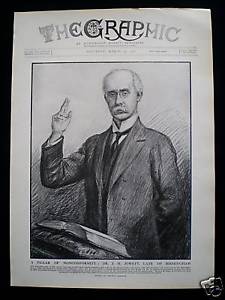
Sunday’s coming. The Lord’s Day is on the way. And Christ’s preachers must be ready. We must gird up the loins, go, and proclaim Christ from behind the sacred desk.
It’s my regular practice to spend time every Friday and Saturday reading something that stirs my soul for Christ and for preaching His beauty. Today it was a chapter from J. W. Jowett’s book, The Preacher: His Life and Work. The selection is titled “The Perils of the Preacher.”
Before I summarize them, let’s get to know the old man a bit.
A Grave Preacher
 After hearing the great Dr. Fairbairn preach, Jowett told his students at Airedale College, “Gentlemen, I will tell you what I have observed this morning: behind that sermon there was a man.” Although The Preacher provides scant autobiographical information, I always have same sense in reading Jowett’s work—there is gravity in his message.
After hearing the great Dr. Fairbairn preach, Jowett told his students at Airedale College, “Gentlemen, I will tell you what I have observed this morning: behind that sermon there was a man.” Although The Preacher provides scant autobiographical information, I always have same sense in reading Jowett’s work—there is gravity in his message.
Jowett was born in 1863 in Halifax, West Yorkshire. Like many great ministers before him, Jowett initially resolved to study law. God soon called him into the gospel ministry. He went on to train at Edinburgh and Oxford before assuming his first pastoral position at St. James Church in Newcastle-upon-Tyne. The church held over 1,000 seats, and none were empty during Jowett’s ministry.
In 1911 he became the pastor at Fifth Avenue Presbyterian Church in New York. John Bishop says,
The church was crowded long before the hour of Jowett’s first service. Reporters crowded the side galleries, expecting to find a sensational preacher with dazzling oratory and catchy sermon topics on current events. Instead they found a shy, quiet little man, bald-headed and with a cropped white moustache, who spoke in a calm, simple manner.
He was at Fifth Avenue when he delivered the Lyman Beecher lectures on a pastor’s life and ministry. He stayed in New York until 1918 when he was called to succeed G. Campbell Morgan at Westminster Chapel in London. It was his last pastoral post, as he died in 1923.
The Preacher’s Perils
So, then, what are some common perils threatening pastors? Jowett mentions four.
- Deadening familiarity with the sublime. “I think this is one of the most insidious, and perhaps the predominant peril in a preacher’s life. A man my live in mountain country, and lose all sense of the heights. . . . The preacher lives almost every hour in sight of the immensities and the eternities—the awful sovereignty of God, and the glorious, yet cloud-capped mysteries of redeeming grace. But here is the possible tragedy: he may live in constant sight of these tremendous presences and may cease to see them.”
- Deadening familiarity with the commonplace. “There is an equally subtle peril of our becoming dead to the bleeding tragedies of common life.” Jowett mentions several things, but focuses mostly on a deadened sense of the tragedy of death. “Familiarity may be deadly, and we may be dead men in the usually disturbing presences of sorrow, and pain, and death. The pathetic may cease to melt us, the tragic may cease to shock us. We may lose our power to weep.”
- Possible perversion of our emotional life. “The preaching of the Gospel of the Lord Jesus Christ demands and creates in the preacher a certain power worthy of emotion, and this very emotion becomes the center of new ministerial danger. . . . That is to say, the evangelical preacher, with his constant business in great facts and verities that sway the feelings, may become the victim of nervous depression, and in his nervous impoverishment his moral defences may be relaxed, the enemy may leap within his gates, and his spirit may be imprisoned in dark and carnal bondage.”
- The perilous gravitation of the world. “I say you meet that danger everywhere, but nowhere will you meet it in a more insidious and persistent fashion that in the Christian ministry. [Worldliness] is round about us like a malaria, and we may become susceptible to its contagion.” “In the perilous gravitation of worldliness there is more than an illicit spirit of compromise: there is what I will call the fascination of the glittering.” “We may become more intent on full pews than on redeemed souls.“
Jowett’s remedy to such pitfalls is proper: a renewed commitment to Christ through the means of grace. “We must,” Jowett declares, “assiduously attend to the culture of our souls. We must sternly and systematically make time for prayer, and for the devotional reading of the Word of God. We must appoint private seasons for the deliberate and personal appropriation of the Divine Word, for self-examination.”
Brothers of the pulpit, if we do not take heed of our doctrine and practice, we will fall into a perilous condition. And Jowett warns what that will mean:
Our characters will lose their spirituality. We shall lack that fine fragrance which makes people know that we dwell in ‘the King’s gardens.’ There will be no heavenly air about our spirits. . . . We are wordy, but not mighty. We are eloquent, but do not persuade. We are reasonable, but we do not convince. We preach much, but we accomplish little. We teach, but we do not woo. We make a ‘show of power,’ but men do not move.
